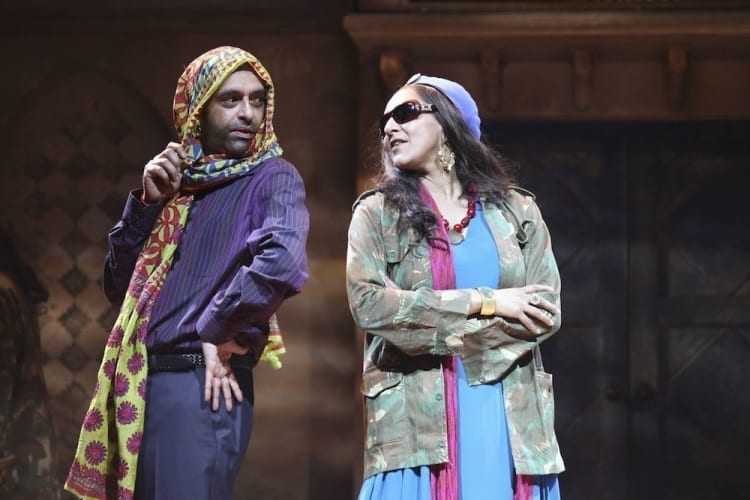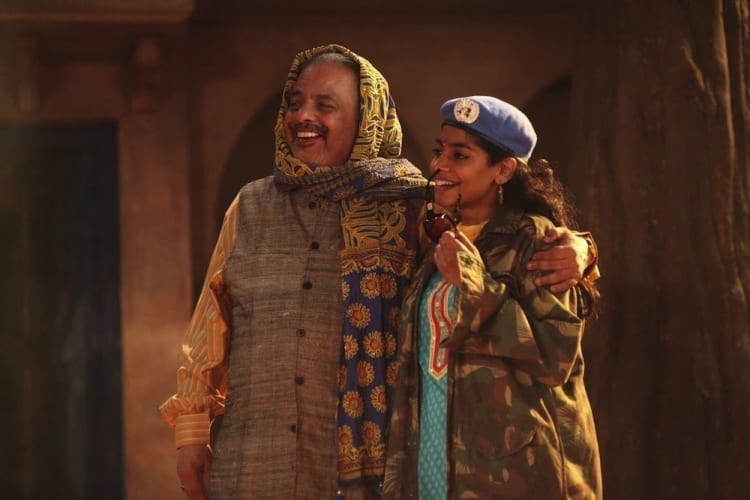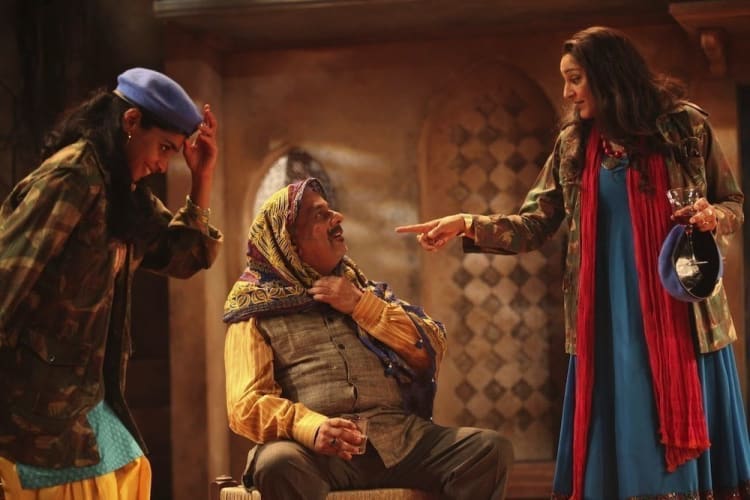If you like your ethnic ‘otherness’ painted in broad, multi-coloured brushstrokes, then the Courtyard Theatre Stratford will be the place for you this summer.
This popular theatrical space reopens its doors, fully bedecked in all its Indian subcontinental glory. Battered though brightly painted bicycles hang from the ceiling. Lights twinkle as the decorative reds, yellows and oranges of an Indian wedding festivity cascade with saffron frenzy over every surface. Musicians play their heady rhythmic dances, punctuated by the ubiquitous cacophony of car, motorcycle and moped horns, the traditional soundtrack to daily street-life in any urban Indian community. Mumbai, Kolkata. This is the world conjured in a theatre that, unlike its grown-up replacement down the road, invites audience participation from the moment you enter its courtyard confines.
We enter the theatre itself only to be greeted by more colour and noise. A street scene is backed by a sandy stuccoed façade of a building. An upper gallery and appropriate entrances and exits are reminiscent of an early modern playhouse turned Indus suburb. Stage right, a staircase meanders up to the second gallery. Upstage left, a tree, itself festooned with windblown detritus of celebrations past, embraces the sky like an aged uncle, towering over the action beneath. It is dusty and smoky, hot and sticky. It is India in all its beauty.
Shakespeare’s Much Ado About Nothing is resituated to this Indian setting in celebration of the RSC’s World Shakespeare Festival. In a year when companies from around the world have offered their uniquely international take on Shakespearean drama, joining athletes in a cultural extravaganza of Olympic proportions, this Much Ado celebrates its own decidedly home-grown take on India’s relationship with the Bard.
That doyenne of British comedy actors, Meera Syal, adds a touch of upper caste class to proceedings. Syal’s Beatrice is a nuanced, strong-willed though deeply sensitive creature, whose apparent unmarriageability stems from a lack of male suitors to match her wit. Syal presents a Beatrice of such complex emotional character that the play becomes elevated into a statement about frustrated female hope and expectation.
Unfortunately, Syal’s performance is less well served by the Benedick of Paul Bhattacharjee. As an actor, Bhattacharjee has excelled elsewhere. In this production, his natural charm never fully glows. It is as though this Benedick has become strangely conflated with Jaques, and a world-weariness of seven-aged dimensions that has clouded his judgement.
More convincing is the delightful performance of Amara Karan as Hero. Karan exudes the innocence of youth, her face a beacon of delight and hope. When Hero is rejected at her wedding, this youthful innocence is transformed into a bitterness that guarantees her equally poignant rejection of her father. Madhav Sharma’s Leonato will never be forgiven for his blind fury. Leonato’s outburst, which veers uncomfortably towards an honour killing through his patriarchal expression of family pride, ensures the loss of daughter at the moment of her timely rebirth.
Hero appears on her wedding day with all the proud serenity of an innocent bride. The wedding is itself gloriously enacted, with the Courtyard exploding with Bollywood colour and celebratory sound. Members of the audience are invited to join the family onstage, a metatheatrical touch that adds to Hero’s despair as she is denounced by the Anglicized public school pomposity of Sagar Arya’s Claudio in full view of the assembled gathering. For this scene alone, the play is a success.
For many, the show is stolen, however, by the comic antics of Anjana Vasan. Playing an ostensibly silent Maid, Vasan brings a freshness and lightness of dramatic touch to an otherwise heavy, burdensome production. Each manic entrance adds to the absurdity of the other characters and to her own individualized identity. This should, of course, not be the case. There are so many potentially comic moments in what could be a fast-paced, witty play. Under the direction of Iqbal Khan, all lightness of touch is lost as the overarching theme is driven home with relentless vigour.
The Indian theme seems, therefore, the play’s strength as well as its weakness. When dialogue becomes lost in the impenetrability of an accent, or when cultural difference is not celebrated but mocked, the play becomes slightly distasteful in its stereotyping. Dialogue, such as, “He’s the only man in India,” or the cross-dressing absurdity of the party scene, add an incomprehensibility all of its own.
Why should this be the case? Perhaps, as the World Shakespeare Festival and Globe to Globe seasons have shown, ‘international’ is best understood in the context of the nations who embrace Shakespeare as their own. With this production of Much Ado, we have a parody or pastiche of ‘internationalism’, with apparently second generation British actors pretending to return to their cultural roots in a decidedly colonial way. Not ever intended as offensive or racially subversive, this Much Ado is nevertheless unable to offer anything other than the veneer of Indian culture, served on a bed of Bradford or Birmingham Anglicized rice. Overlong and overindulgent, it does little other than cement the comedy caricature of India in the British psyche.


